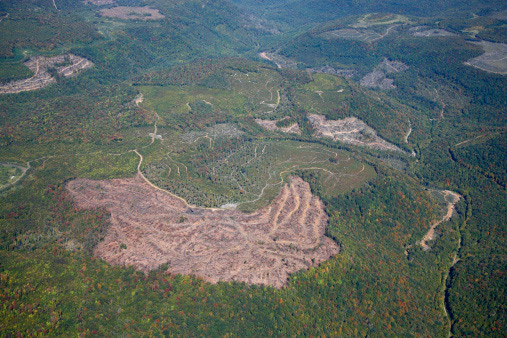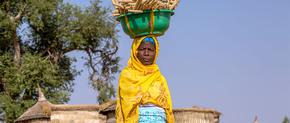The views expressed in our content reflect individual perspectives and do not represent the authoritative views of the Baha'i Faith.
Whosoever loves money does not love God and whosoever loves God does not love money… The souls must be detached from the world. Those souls who are attached to this world and its wealth are deprived of spiritual advancement. – Abdu’l-Baha, Star of the West, Volume 4, p. 122.
Last week I went to a unique interfaith environmental gathering meant to heal an injured forest—but strangely enough, I wound up wondering if we worship money.
Just a few miles from where I live in the Sierra Nevada foothills in Northern California, some friends found an ugly scar on the earth called a clearcut, and they decided to do something about it.
Have you ever seen one? They happen when logging companies take down every tree in sight.
 Probably the best way to find the big clearcuts is from the air. In a small plane or a helicopter, all you need to do is fly across just about any unprotected expanse of forest, and sooner or later you’ll likely see big bald spots on the land. Usually they’re done out of the view of the public, to hide the hideous results of a decimated forest.
Probably the best way to find the big clearcuts is from the air. In a small plane or a helicopter, all you need to do is fly across just about any unprotected expanse of forest, and sooner or later you’ll likely see big bald spots on the land. Usually they’re done out of the view of the public, to hide the hideous results of a decimated forest.
In fact, foresters and logging companies now routinely figure out ways to conceal their clearcuts. If you drive on the major freeways and highways in parts of Northern California and Oregon, for example, it still seems like you’re passing through thick forests, because you can see what looks like dense stands of trees on both sides of the road. But I’ve flown over some of those highways, and they only create an illusion. If you see the area from the air, you’ll notice a relatively thin strip of trees alongside each road, and huge clearcuts beyond, in the areas where drivers and their passengers can’t see the devastation.
Clearcutting occurs because logging companies know it’s the most profitable way to log a forest. The alternative, called selective cutting, which harvests individual trees but leaves most of the forest intact and standing, costs more and takes more skill and time.
But back to healing the forest. I joined a group of a fifty or so people who went out to this clearcut area last Sunday. A long way down a dirt logging road, it wasn’t easy to find—but we found it, and the sight overwhelmed some of us. Deforestation is hideous–it looked like a bomb had gone off. In the distance you could see healthy green trees, but in the center of the clearcut nothing remained except stumps and the dead, amputated limbs of cedars and pines and oaks. Bare dirt predominated, littered with the trash the loggers left behind. Rain had eroded the topsoil. Not much grew. Some people, especially the children who came to the event, cried when they saw it.
I thought a new crop of young trees might have started to grow, since the clearcut we visited was already more than a year old, but only a few scraggly young sprouts had managed to come up. I soon learned why—apparently logging companies, after their clearcutting, typically treat the land with toxic herbicides to prevent “undesired” native species from growing back. After killing everything else, they replant the area “selectively” with single-species tree seedlings to create what they call an “even-aged forest.” In other words, the company had chopped down an entire section of forested land, made that land sterile, and then planted a tree farm, ready for their next clearcut in fifty years. The forest’s natural diversity had vanished overnight, along with the habitat it offered for thousands of animals and the oxygen those trees would exhale for the next few centuries.
We spent the afternoon in an interesting way. First, we gathered in a big circle and read the Declaration of the Rights of Mother Earth, originally affirmed at the World People’s Conference on Climate Change and the Rights of Mother Earth on April 22nd, 2010, in Cochabamba, Bolivia. We focused on these words from the Declaration:
We, the peoples of Earth are all part of Mother Earth, an indivisible, living community of interrelated and interdependent beings with a common destiny. Each human being is responsible for respecting and living in harmony with Mother Earth.
During the reading of the Declaration, people expressed the grief and pain they felt for the harm being done to the earth and its creatures. We acknowledged our part in that harm, resolved to make amends for it, and prayed for healing for the community of life. A Methodist minister hung up a banner that said “Earth Before Profit.” Native Americans in the group led us in a round dance. We sang songs together, each of us expressing the hope that our planet would recover, regenerate and continue to sustain us.
Then we started planting. Children scattered seeds, and we all dug down into the ground and planted living seedlings and young trees. Everyone did their part to heal the damage. Only the youngest children there would ever see the results, we figured, but that hope was enough.
The experience made me think about money—probably because we could all see the logging company had clearcut there solely to make a profit, without much regard for any other considerations or consequences. Like the banner my friend the minister had hung, I wondered if the profit motive has become our usual, accepted justification for all manner of rapacious and shameful behavior in this materialistic world. I wondered whether we’re now paying the price for ignoring the spiritual implications of that capitalism and materialism. I wondered, in the face of such ecological damage, if we have come to the point where we will destroy our only home for the worship of money.
So I thought I’d write a short series of essays this week about the connections between capitalism, commerce and the environment, and how we can try to reconcile and heal the material world with our spiritual nature. Throughout this series, I’ll continue to rely on this seminal quote from the Baha’i teachings, which I couldn’t stop thinking about as we all stood on the dirt in that slaughtered forest:
Every man of discernment, while walking upon the earth, feeleth indeed abashed, inasmuch as he is fully aware that the thing which is the source of his prosperity, his wealth, his might, his exaltation, his advancement and power is, as ordained by God, the very earth which is trodden beneath the feet of all men. There can be no doubt that whoever is cognizant of this truth, is cleansed and sanctified from all pride, arrogance, and vainglory. – Baha’u’llah, Epistle to the Son of the Wolf, p. 44.
You May Also Like
Comments

















Absolutely, mon ami, but only the down payment has been paid according to the Guardian in Citadel of Faith
'Indeed a foretaste of the devastation which this consuming fire [the cancer of materialism] will wreak upon the world, and with which it will lay waste the cities of the nations participating in this tragic world engulfing contest [capitalism] has been afforded by the last World War,'
A FORETASTE!
For many in the third world that down payment is disastrous enough already ...but it can hardly be compared with what's imminent:
This is why the children cry:
'Say: Nature in its essence is the embodiment of My Name, the Maker, the Creator.' Baha'u'llah
Of all people on God's earth Baha'is must be seen as frugalists when it comes to the environment and detached when it comes to money.When treasurers of Bahá’í institutions along with other officers and academics in the Faith decline any comment regarding my essay about the demonstrably erroneous interpretation that 'money is the lifeblood of the Cause' we must understand that we Baha'is need educating vis-a-vis the dangers of money and that others will be called upon to achieve the triumph of the Cause if we fail to play our part. When in the wake of that silence a national Bahá’í magazine (The Australian Bahá’í of Sept 2014) reiterates without sources the same shibboleth connecting money to the lifeblood of the Cause additional proof is evident pertaining to a failure to consult
Baha'i love
Paul